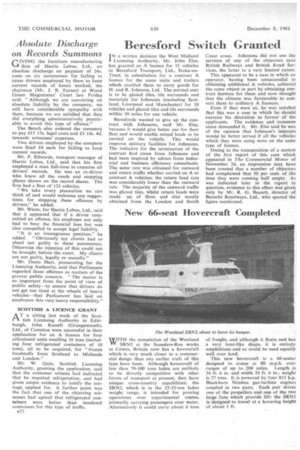Beresford Switch Granted
Page 56

If you've noticed an error in this article please click here to report it so we can fix it.
IN a written decision the West Midland
Licensing Authority, Mr. John Else, has granted an A licence for 11 vehicles to Beresford Transport, Ltd., Stoke-onTrent, in substitution for a contract A licence for the same units and trailers which enabled them to carry goods for H. and R. Johnson, Ltd. The normal user is to be glazed tiles, tile surrounds and materials for Johnsons (excluding Scotland, Liverpool and Manchester) for 10 vehicles and glazed tiles and tile surrounds within 10 miles for one vehicle.
Beresfords wanted to give up the contract with Johnsons, said Mr. Else, because it would give better use for their fleet and would enable mixed loads to be carried on the vehicle. This would improve delivery facilities for Johnsons. The initiative for the termination of the contract had come from Johnsons and had been inspired by advice from industrial and business efficiency consultants. The same rate was obtained for outward and return traffic whether carried on A or contract A vehicles; the return load rate was considerably lower than the outward rate. The majority of the outward traffic was glazed tiles, whilst return loads were made up of flints and clay mostly obtained from the London and South Coast areas. Johnsons did not use the services of any of the objectors save British Railways and British Road Services, the latter to a very limited extern.
This appeared to be a case in which an operator, having been unsuccessful in obtaining additional A vehicles, achieved the same object in part by obtaining contract licences for them and now thought that the climate was favourable to convert these to ordinary A licences.
Even if that were so, he was satisfied that this was a case in which he should exercise his discretion in favour of the applicants. The evidence and common sense demanded it. Mr. Else said he was of the opinion that Johnson's interests would be better served if all the vehicles which they were using were on the same type of licence.
Owing to the transposition of a section of the first report of this case which appeared in The Commercial Motor of November 24, an impression may have been created that a number of objectors had complained that 50 per cent. of the time they were running half empty. As was indicated later in the report in question, evidence to this effect was given only by Mr. R. G. Bassett, director of Bassetts Roadways, Ltd., who quoted the figure mentioned.




































































































































